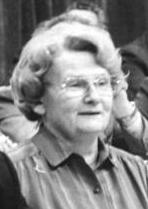Life
Ursula Rose was born in Cottbus, historically the cultural centre of Germany's Sorbian ethnic minority. Her father worked as a driver. Between 1942 and 1945 she studied to become a teacher of German and music at the teacher training college in Exin (Kreis Bromberg), in a part of Germany that had been in Poland between 1920 and 1939, and would be transferred back to Poland in 1945. At the end of the war she moved back west as far as Spreewald where she was briefly employed as a probationary teacher at a small village school. From 1946 until 1951 she taught at a primary school in her birth city of Cottbus, since 1945 administered as part of the Soviet occupation zone. [1]
In April 1946 the contentious merger took place, in that part of what had been Germany now under Soviet administration, between the Communist Party and the more moderate SPD. This provided a foundation for a new political order, creating the Socialist Unity Party which, like thousands of her fellow citizens, she lost no time in joining. [2] In October 1949 the Soviet occupation zone was relaunched as the Soviet sponsored German Democratic Republic, a new form of German single party dictatorship, with the Socialist Unity Party ("Sozialistische Einheitspartei Deutschlands" / SED), now effectively purged of former Social Democrats, installed as the new ruling party. Between 1951 and 1952 she taught at the Teacher Training Institute ("Institut für Lehrerbildung" / IfL) in Cottbus. [1]
It is not clear at what date Ursula Rose married the composer and musicologist Erhard Ragwitz, but available sources concerned with her political career use her married name, identifying her as Ursula Ragwitz. In 1953 she founded the music school in Cottbus, becoming its first director, at the same time becoming head of culture with the district council. From May/June 1954 she became a department head with the regional arts commission. After this she served successively as assistant, senior assistant and then lecturer at the Dresden Music Conservatory. After that, until 1963 she served as Director of the Hoyerswerda Music Academy. [1] Between 1963 and 1969 she was the deputy chair of the Cottbus regional council for Culture, Well-bring and Sport. During this period, in 1967, she undertook a further training course for senior culture officers at the party central committee's Academy for Social Sciences in Berlin. Directly after that, in 1968 she became a member of the national executive of the Association of Presentation Arts ("Verband der darstellenden Künstler" / VdK). [1]
She switched to the national level in 1969 when she became a political assistant in the Culture Department of the Central Committee. Promotion followed in 1973 when she became deputy department head, and again in November 1975 when she took over as acting director. Finally, in March 1976, she took over as head of the Culture Department from Peter Heidt who moved on to an academic function as a Professor for Economic History at the party's Karl Marx Academy. [3] There had been five Culture Department heads since 1957, but Ursula Ragwitz would remain in the post until 1989. [4] She also headed up the Politburo's Culture Commission between 1976 and 1989, [1] and occupied various other positions of influence in the arts and media sector. [4]
Her position in charge of the Cultural Department gave Ragwitz considerable influence over cultural life and work in the German Democratic Republic [5] and also, some contended, over authors in West Germany. [6] [7] The party's monopoly of various forms of patronage and sponsorship gave her the power to affect the material well-being of East German authors, such as, for instance, Stephan Hermlin. [8] On top of that she was also given charge, by Central Committee Secretary Kurt Hager, of determining approval processes for foreign travel and performances by artists [9] and she was given co-responsibility for the conditions under which the hugely popular books of Karl May (1842-1912) might be both published and produced as films. [10]
Between 1981 and 3 December 1989 Ursula Ragwitz was herself a member of the Party Central Committee, which became of the leading role afforded the party under the Leninist structure built into the East German constitution placed her at the heart of the country's power apparatus. [11]
Since the demise of the German Democratic Republic Ursula Ragwitz has lived with her husband as a pensioner in Berlin.
This page is based on this
Wikipedia article Text is available under the
CC BY-SA 4.0 license; additional terms may apply.
Images, videos and audio are available under their respective licenses.











